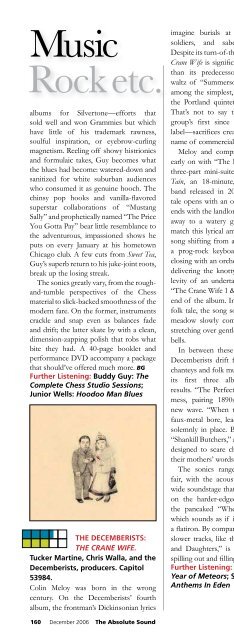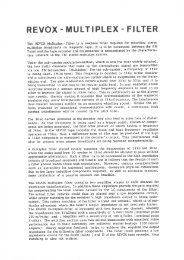Create successful ePaper yourself
Turn your PDF publications into a flip-book with our unique Google optimized e-Paper software.
Music<br />
Rock etc.<br />
albums for Silvertone—efforts that<br />
sold well and won Grammies but which<br />
have little of his trademark rawness,<br />
soulful inspiration, or eyebrow-curling<br />
magnetism. Reeling off showy histrionics<br />
and formulaic takes, Guy becomes what<br />
the blues had become: watered-down and<br />
sanitized for white suburban audiences<br />
who consumed it as genuine hooch. The<br />
chinsy pop hooks and vanilla-flavored<br />
superstar collaborations of “Mustang<br />
Sally” and prophetically named “The Price<br />
You Gotta Pay” bear little resemblance to<br />
the adventurous, impassioned shows he<br />
puts on every January at his hometown<br />
Chicago club. A few cuts from Sweet Tea,<br />
Guy’s superb return to his juke-joint roots,<br />
break up the losing streak.<br />
The sonics greatly vary, from the roughand-tumble<br />
perspectives of the Chess<br />
material to slick-backed smoothness of the<br />
modern fare. On the former, instruments<br />
crackle and snap even as balances fade<br />
and drift; the latter skate by with a clean,<br />
dimension-zapping polish that robs what<br />
bite they had. A 40-page booklet and<br />
performance DVD accompany a package<br />
that should’ve offered much more. BG<br />
Further Listening: Buddy Guy: The<br />
Complete Chess Studio Sessions;<br />
Junior Wells: Hoodoo Man Blues<br />
The Decemberists:<br />
The Crane Wife.<br />
Tucker Martine, Chris Walla, and the<br />
Decemberists, producers. Capitol<br />
53984.<br />
Colin Meloy was born in the wrong<br />
century. On the Decemberists’ fourth<br />
album, the frontman’s Dickinsonian lyrics<br />
160 December 2006 The Absolute Sound<br />
imagine burials at sea, bayonet-toting<br />
soldiers, and saber-wielding tenants.<br />
Despite its turn-of-the-century dialect, The<br />
Crane Wife is significantly less precocious<br />
than its predecessors, with the gypsy<br />
waltz of “Summersong” taking its place<br />
among the simplest, most melodic tunes<br />
the Portland quintet has ever recorded.<br />
That’s not to say that the album—the<br />
group’s first since signing to a major<br />
label—sacrifices creative ambition in the<br />
name of commercial gain.<br />
Meloy and company make this clear<br />
early on with “The Island,” a 12-minute,<br />
three-part mini-suite reminiscent of The<br />
Tain, an 18-minute, one-track EP the<br />
band released in 2004. The murderous<br />
tale opens with an ominous warning and<br />
ends with the landlord’s daughter slipping<br />
away to a watery grave. The musicians<br />
match this lyrical ambition lock step, the<br />
song shifting from a distorted boogie to<br />
a prog-rock keyboard freak-out before<br />
closing with an orchestral flourish, Meloy<br />
delivering the knotty verses with all the<br />
levity of an undertaker. A second suite,<br />
“The Crane Wife 1 & 2,” appears near the<br />
end of the album. Inspired by a Japanese<br />
folk tale, the song sounds like a summer<br />
meadow slowly coming to life, sunlight<br />
stretching over gentle guitar and chirping<br />
bells.<br />
In between these epic bookends, the<br />
Decemberists drift further from the sea<br />
chanteys and folk musings that populated<br />
its first three albums—with varying<br />
results. “The Perfect Crime” is a perfect<br />
mess, pairing 1890s prose with 1980s<br />
new wave. “When the War Came” is a<br />
faux-metal bore, leaden guitar marching<br />
solemnly in place. Better is the acoustic<br />
“Shankill Butchers,” a sadistic bedtime tale<br />
designed to scare children into minding<br />
their mothers’ words.<br />
The sonics range from excellent to<br />
fair, with the acoustic cuts displaying a<br />
wide soundstage that seems to be lacking<br />
on the harder-edged tunes, particularly<br />
the pancaked “When the War Came,”<br />
which sounds as if it’s been run over by<br />
a flatiron. By comparison, the imaging on<br />
slower tracks, like the redemptive “Sons<br />
and Daughters,” is first rate, accordion<br />
spilling out and filling the room. AD<br />
Further Listening: Laura Veirs:<br />
Year of Meteors; Shirley Collins:<br />
Anthems In Eden<br />
HOT<br />
WAX<br />
Bob Dylan:<br />
Modern Times.<br />
Jack Frost, producer.<br />
Columbia 82876 (two-LP and CD).<br />
Funny how life works. Back in 1992 and 93,<br />
few paid attention when Bob Dylan released<br />
two of his finest albums—Good As I Been To<br />
You and World Gone Wrong—solo outings in<br />
which he put his all into some of his favorite<br />
historic blues and folk songs. Today, it seems<br />
the 65-year-old chameleon can do no wrong.<br />
In actuality, few but the die-hards paid any<br />
attention for a long time. To the casual listener,<br />
the man who took the 60s by storm might as<br />
well have gone fishin’ from his late-70s bornagain<br />
phase up through 1997’s Time Out Of<br />
Mind. But Dylan hadn’t gone anywhere, he<br />
kept on being Dylan—as mercurial as the<br />
sound he once said he was aiming for on<br />
Blonde on Blonde. Sure, his records were largely<br />
forgettable up until 1989’s under-appreciated<br />
Oh Mercy, and his live performances, with<br />
unrecognizable melodies and mumblemouthed<br />
lyrics, had turned into what<br />
sounded like deliberate perversions of his<br />
greatest songs. But for those keeping score,<br />
those records of 89–93, and the so-called<br />
Never Ending Tour that soon followed (and<br />
continues to this day), signaled that Dylan<br />
had been back for some time.<br />
His most recent elevation to God-like<br />
status began last year, with the publication of<br />
Chronicles Volume One and Martin Scorsese’s<br />
documentary, No Direction Home. Now we<br />
have Modern Times, over which critics have<br />
been drooling with superlatives and five-star<br />
ratings. Dylan’s 43rd studio effort isn’t a bad










